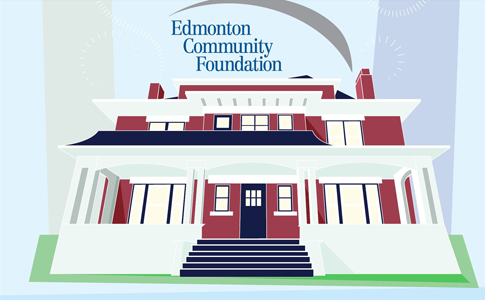Every year, Edmonton Community Foundation (ECF) receives dozens of notes, cards and e-mails of appreciation. In fact, there are probably few people in Edmonton who haven’t been touched by the foundation. Many just don’t know it. From reusable plates bought by the Edmonton Folk Music Festival in 1991 – you can still see ECF’s logo on the plates today – to a recent $1.5 million loan (through the Social Enterprise Fund) that has supported CKUA’s new home on Jasper Avenue, ECF has helped hundreds of organizations over the past 25 years.
Groups ranging from the Seniors’ Association of Greater Edmonton to the Bissell Centre, the John Howard Society and the Citadel Theatre have benefitted from ECF grants. “We certainly get lots of thank you notes and various kinds of appreciation,” says current CEO Martin Garber-Conrad, noting the foundation has had to encourage recipients not to send plaques or gifts of thanks.
When former Edmonton Police Chief, Doug McNally, became CEO of ECF in 1995, the six-year-old organization had just two full-time staff, including McNally, and held only “a handful of funds.”
The nature of endowment giving means even a modest donation to ECF will continue to give for generations because donations are invested, and the investment returns provide support for the community.
Today, as the organization celebrates its 25th anniversary, its funds have grown to more than $400 million and the foundation’s historic office houses 16 full-time and three part-time employees. The foundation acts as a steward between donors and Edmonton charities and, in 25 years, it has allocated more than $150 million into the community.
The nature of endowment giving means even a modest donation to ECF will continue to give for generations because donations are invested, and the investment returns provide support for the community. When invested in a permanent endowment fund, an initial donation of $50,000, for example, will grant as much as the initial amount in about 20 years.
While ECF has grown substantially in the last quarter century, at its core it does exactly what it did 25 years ago. “It’s changed in that it’s larger, but I don’t know that the core of the foundation has ever changed,” says former chair Karen Platten, who has been involved with the organization for 18 years in various volunteer roles. Currently she serves as chair of Wills Week.
Twenty-five years ago, a combined $15 million donation from the Poole and Stollery families enabled the organization to move from idea into operation.

McNally says his decade as CEO of the organization was punctuated by one common theme – growth. “It was an exciting 10 years,” he says. Programs including Wills Week (a public service in which estate lawyers volunteer their time to present seminars on wills) and the Belcourt Brosseau Mtis Awards Fund (a scholarship program for Mtis students that’s doled out more than $4.5 million in awards) were established. As the organization and its funds grew, McNally says the foundation also decided to remove a $30,000 cap limiting grant amounts payable, thus enabling ECF to better respond to pressing community needs, everything from poverty to young parents.
Garber-Conrad took over as CEO in 2005 and says the organization has only continued to grow. “The growth enabled us to do so much more in the community,” he says. In 2007, ECF introduced Foundation Directed Initiatives (FDI) as a way to support high priority projects through multi-year funding. Through the FDI, “rather than sitting and waiting for grant applications to come in, we use our knowledge of what’s going on in the community to actually reach out and initiate grants,” Garber-Conrad explains.
Through FDI, ECF has helped the Terra Centre for Teen Parents develop their services for young dads, engaging them more fully in their children’s lives. They were also able to extend drop-in hours at the Bissell Centre and help the Seniors’ Association of Greater Edmonton address the needs of seniors.
Garber-Conrad believes the FDI will be a focus going forward, as will a youth program that was launched in 2011 and the Alberta Enterprise Venture Fund, introduced in 2013. The Venture Fund is a way for the foundation to invest its capital in projects ranging from poverty to cultural initiatives and is a unique model in Alberta and Canada. “I think if we look back 10 or 20 years from now, we’re going to see this (Venture Fund) as one of the major changes in the history of the foundation that made it even more impactful,” says Carman McNary, current chair of the board.
Garber-Conrad says in the future the organization will focus on reaching a new generation of donors and continue to spend time and energy getting to better know the community’s ever-evolving needs. “As we build the community fund and social finance capacity of the foundation, we will have the ability to respond to things in the next 25 years that even those of us here now wouldn’t have thought of,” he says.
